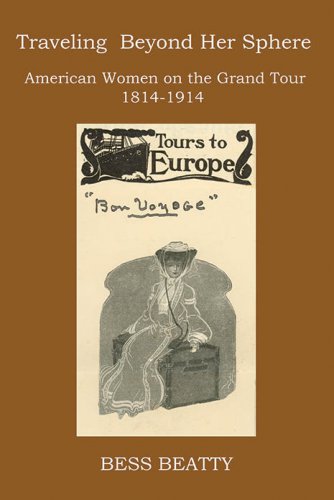
About the Author
Bess Beatty graduated from Wake Forest University and earned her Ph.D. in history at Florida State University. She has taught at Shorter College, the University of Iowa and Oregon State University. She has twice been a Fulbright professor and taught US history at the University of Rome and the University of Zagreb. She served three times as Northwest professor for a study abroad program in Siena, Italy. In 2008 and 2011 she taught for the University of Virginia’s Semester at Sea program. She has published two books: A Revolution Gone Backward: The Black Response to National Politics, 1876-1896 and Alamance: The Holt Family and Industrialization in a North Carolina County, 1837-1900. She currently lives in Washington DC and is a member of the Guild of Professional Tour Guides of Washington DC.
TRAVELING BEYOND HER SPHERE: American Women on a European Grand Tour, 1814 to 1914
Bess BeattyNew Academia Publishing, 2016
328 Pages, 12 Illustrations
ISBN 978-0-9974962-2-2 Paperback
ISBN 978-0-9974962-3-9 Hardcover
$40.00 Hardcover
For BULK ORDERS, order directly from New Academia Publishing.
Queries: orders@newacademia.com
About the Author
Bess Beatty graduated from Wake Forest University and earned her Ph.D. in history at Florida State University. She has taught at Shorter College, the University of Iowa and Oregon State University. She has twice been a Fulbright professor and taught US history at the University of Rome and the University of Zagreb. She served three times as Northwest professor for a study abroad program in Siena, Italy. In 2008 and 2011 she taught for the University of Virginia’s Semester at Sea program. She has published two books: A Revolution Gone Backward: The Black Response to National Politics, 1876-1896 and Alamance: The Holt Family and Industrialization in a North Carolina County, 1837-1900. She currently lives in Washington DC and is a member of the Guild of Professional Tour Guides of Washington DC.
About the book
The nineteenth-century ideal of domesticity identified home as women’s proper sphere, but the ideal was frequently challenged, profoundly so when woman left home and country to travel in foreign lands. This book explores the reasons for and ramifications of women making a Grand Tour, a trip to Europe, between 1814 and 1914; this century between major European wars witnessed the golden age of American Grand Tours.
Men and women alike were inspired by a Euro-centric education that valued the Old World as the fountainhead of their civilization. Reaching Europe necessitated an Ocean crossing, a disorienting time taking women far from domestic comfort. Once abroad, American women had to juggle accustomed norms of behavior with the demands of travel and customs of foreign lands. Wearing proper attire, even when hiking in the Alps, coping with unfamiliar languages, grappling with ever-changing rules about customs and passports, traveling alone – these were just some of the challenges women faced when traveling. Some traveled with their husband, others with female relatives and friends and a few entirely alone. Traveling companions had to agree on where to stay, when and where to dine, how to travel, and where to go.
The sinking of the Titanic in 1912 made clear that even in the twentieth century, a Grand Tour involved risk. Because more women survived then men, some insisted that the Titanic’s example should curb female independence. However, a growing number of women continued making a Grand Tour for the next two year. It was the Outbreak of war in Europe in 1914 that temporarily brought an end to a century of female Grand Tours.
Praise
“Beatty’s ability to weave the experiences of hundreds of American women on the Grand Tour in Europe into a consistent narrative is per se a remarkable feat. But the Author does much more than that. She uses the “journey” as trope to represent the long and difficult process of women’s emancipation, in its several cultural, psychological, social, and political dimensions.”
—Susanna Delfino, Professor of American History, retired. University of Genoa, Italy





 Coming Soon
Coming Soon Awards
Awards